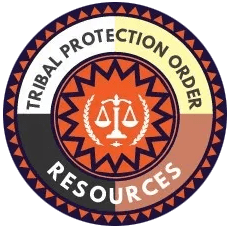Orders of protection and Issues of Tribal Jurisdiction in Indian Country (StrongHearts Native Helpline):
There are many legal factors advocates consider when addressing domestic violence and sexual assault in Indian Country.
Many tribes face unparalleled obstacles when attempting to address the issues of domestic violence and sexual assault on their land, and Native American survivors of domestic violence, dating violence, and sexual assault often experience jurisdictional hurdles when they report or attempt to heal. Every tribe, federally recognized or not, faces a maze of legal systems and statutory frameworks that intersect, often leaving victims without a clear path to justice.
It is important to know that federally recognized tribes are sovereign nations in the United States, but as a result of a 1978 Supreme Court decision in the case of Oliphant v. Suquamish Indian Tribe, tribes were stripped of their authority to prosecute non-Native people (ex. individuals of other races) for on-reservation crimes.
Because tribes could not exercise criminal jurisdiction for several decades — the right to prosecute violent crimes committed in Indian Country by non-Native people — both state and federal authorities were expected to exercise jurisdiction in these cases.
However, state and federal authorities often declined to prosecute in the majority of these cases for different reasons. This situation left most tribes powerless to criminally punish non-Native people who came onto reservations and committed domestic or sexual violence against Native people. As a result, the prevalence of domestic violence, dating violence, and sexual assault in Indian Country grew astronomically.
In 2013, Congress reauthorized the Violence Against Women Act (VAWA), which restored tribal courts’ ability to exercise “special domestic violence criminal jurisdiction” over domestic and dating violence crimes or violations of protection orders regardless of the defendant’s Native or non-Native status, where the tribes meet certain requirements in accordance with the Indian Civil Rights Act per the U.S. Bill of Rights, the Tribal Law and Order Act, and where the tribe’s criminal justice system fully protects defendants’ rights under applicable federal law. [1]
The reauthorized VAWA went into effect in 2015 and recognizes tribes’ sovereign power to investigate, prosecute, convict, and sentence both Indians and non-Indians who assault Indian spouses or dating partners or violate a protection order in Indian Country. It does not, however, cover sexual assault or rape committed by non-Natives who are strangers to their victims, nor does it protect Native American children who are victims of abuse or assault.
Tribal, state and federal jurisdiction issues remain at the forefront of legal advocacy for domestic violence advocates. Understanding the implications of laws such as Public Law 280, tribal courts and their authority as well as the federal government’s role in prosecuting on-reservation violent crimes, is critical to legal advocacy for any Native American victim of domestic violence. Depending on your situation, you might determine that reporting abuse or taking legal action against an abusive partner is the best course for you.
Tribal Protection Order Resources: an Online Resource for Drafting and Enforcing Tribal Protection Orders
This website is intended to serve as an online resource pertaining to drafting and enforcing tribal protection orders. Note that each tribe is unique with respect to tribal constitutions and codes. The reader should consult the specific tribal constitution and tribal codes for additional requirements regarding drafting and enforcement of tribal protection orders.


